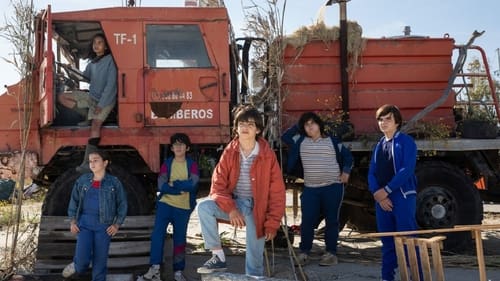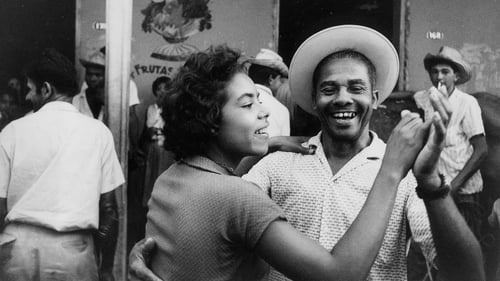Sara Gómez
出生 : 1942-11-08, La Habana, Cuba
死亡 : 1974-06-02
略歴
Sara Gómez was a Cuban filmmaker, screenwriter, musician and journalist. She is recognized as the first Cuban woman to direct a fiction film: De cierto manera (1974).

Executive Producer
The year is 1985. Oliver, a boy with an overflowing imagination, moves with his family to the southernmost corner of Europe, just as Halley's Comet is about to pass by. These events will mark a before and after in the emotional life of Óliver, who will look to the stars for the solution to his problems in the new school, in the neighborhood and at home. To make matters worse, his grandfather, nicknamed "el majara" is encouraged to help him interpret the comet's message and take a step forward in his new Universe.

Writer
Quasi documentary about the creation of the Miraflores housing development after the Cuban revolution. In this first Cuban feature film made by an Afro-Cuban and by a woman, Sara Gómez uses innovative documentary and fictional techniques to focus on the marginales in the poorest, most underdeveloped areas of Cuba. Against a backdrop of dismantled slums and new housing construction, the relationship between a mulatta and a Black Cuban unfolds as a conflict between ingrown ideas of race, class and gender and a Revolution that is trying to dismantle the old, outmoded structures.

Director
Quasi documentary about the creation of the Miraflores housing development after the Cuban revolution. In this first Cuban feature film made by an Afro-Cuban and by a woman, Sara Gómez uses innovative documentary and fictional techniques to focus on the marginales in the poorest, most underdeveloped areas of Cuba. Against a backdrop of dismantled slums and new housing construction, the relationship between a mulatta and a Black Cuban unfolds as a conflict between ingrown ideas of race, class and gender and a Revolution that is trying to dismantle the old, outmoded structures.

Director
Opinions of workers of the textile industry on the theses of the XIII Labor Congress of the CTC.

Screenplay
Documentary about the history of the bateyes, informal settlements surrounding the mills to house workers. Throughout the film, Sara Gómez recovers the political and cultural relevance of black migrants.

Director
Documentary about the history of the bateyes, informal settlements surrounding the mills to house workers. Throughout the film, Sara Gómez recovers the political and cultural relevance of black migrants.

Director
About the election in assembly of the President of the Poder Popular (Popular Power)

Director
An illustration of the difficulties women encounter when they seek to achieve economic integration and equality with men in a country at the height of revolution.

Director
A short poetic evocation by Sara Gómez of Isla de Pinos, the island where Fidel Castro was imprisoned by Batista, where the revolution builds a new society. A juxtaposition of the Presidio Modelo prison with citrus production.

Director
Loose collection of individual portraits of the inhabitants of the Isle of Pinos [now Isla de la Juventud], who tell their stories, share ideas and discuss topics such as racism and crime.

Director
In this film, Sara Gómez documents the everyday life of the Isla de Pinos, the discussions about the problems of construction, the school and the leisure activities of the youth in 1968 and contextualizes these images with Frantz Fanon's thoughts about the construction of a nation through decolonization.

Writer
A documentary that gives a lyrical introduction to Afro-Cuban rhythms. The short features interviews, footage of impromptu street performances, and studio recordings.

Director
A documentary that gives a lyrical introduction to Afro-Cuban rhythms. The short features interviews, footage of impromptu street performances, and studio recordings.

Writer
A pioneer in the genre of autobiographical documentaries, this film made by the renowned Cuban director Sara Gómez explores her family roots to offer a family portrait through photos, popular music, and women’s tales. It is also a powerful document of an age and a way of living: that of middle- or upper-class black families in Cuba, meeting in exclusive bars just before the Cuban Revolution.

Director
A pioneer in the genre of autobiographical documentaries, this film made by the renowned Cuban director Sara Gómez explores her family roots to offer a family portrait through photos, popular music, and women’s tales. It is also a powerful document of an age and a way of living: that of middle- or upper-class black families in Cuba, meeting in exclusive bars just before the Cuban Revolution.

First Assistant Director
A Haitian son returns from fifteen years in Cuba to find his home village afflicted with the double plague of drought and strife. A Cuban production from the director of Memories of Underdevelopment. In Spanish.

Writer
This black-and-white film is a loving portrait of Santiago de Cuba and its people. It provides a view of Cuba as a picturesque country, the product of an earthy mix of black and criollo cultures. The film uses historical images which portray the end of the eighteenth century when Haitian slave owners fled with their slaves to Cuba after the Haitian Revolution.

Director
This black-and-white film is a loving portrait of Santiago de Cuba and its people. It provides a view of Cuba as a picturesque country, the product of an earthy mix of black and criollo cultures. The film uses historical images which portray the end of the eighteenth century when Haitian slave owners fled with their slaves to Cuba after the Haitian Revolution.

Self (uncredited)
A photo montage of Cubans filmed by Agnès Varda during her visit to Cuba in 1963, four years after Fidel Castro came to power. This black & white documentary explores their socialist culture and society while making use of 1500 pictures (out of 4000!) the filmmaker took while on the island.

Director
Documentary short film that shows the manufacturing process of Cuban cigars.

Director

















